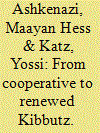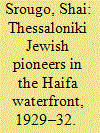| Srl | Item |
| 1 |
ID:
090402


|
|
|
|
|
| Publication |
2009.
|
| Summary/Abstract |
This article deals with the process of change which is taking place in the kibbutz movement of Israel, and the structural and organizational changes in most kibbutzim from the model of a cooperative kibbutz to that of a renewed kibbutz. The article deals with the causes of the crisis and the principles of change, the essence of which is the implementation of the idea of economic rationalism. This change is not total nor is it accompanied by a denial of the fundamental values of kibbutz but it has many forms and takes place at different rates in accordance with the characteristics of each economic unit and each community. The research focuses on Kibbutz 'Galil' as a test case of a kibbutz which has undergone drastic change against the backdrop of a serious economic crisis and thus it represents an extreme example of a kibbutz which has moved completely to the model of a renewed kibbutz, constituting a signpost for other kibbutzim.
|
|
|
|
|
|
|
|
|
|
|
|
|
|
|
|
| 2 |
ID:
175467


|
|
|
|
|
| Summary/Abstract |
This article traces the economic history of the small Jewish maritime community in its hometown of Thessaloniki during the 1920s and its new home of Haifa in the early 1930s. The Thessalonikians’ strong connection to port occupations made them an ideal pioneer in the Zionist scheme of creating a Jewish maritime presence in Mandatory Palestine. The Thessalonikians’ arrival in the Arab-dominated Haifa waterfront led to continuous conflict. The article examines the encounter between the Thessaloniki port culture and the Arab one in Haifa and its reflection in the core issue of the Jewish hold in the port of Haifa.
|
|
|
|
|
|
|
|
|
|
|
|
|
|
|
|
| 3 |
ID:
105433


|
|
|
|
|
| Publication |
2011.
|
| Summary/Abstract |
The article provides an overview of the changes that have taken place in the kibbutzim since 1990 and assesses their significance. Between 1995 and 2010, most kibbutzim abandoned their traditional practice of sharing income "from each according to ability, to each according to need", and began paying differential salaries to members on the basis of the market value of their work. Academics, the kibbutz movement, and the Israeli government agree that kibbutzim that pay differential salaries are still kibbutzim, but they see them as kibbutzim of a new type, the so-called "renewed" kibbutz. More than a third of kibbutz members now work outside their kibbutz, while more than half of the labor performed inside the kibbutzim is now done by nonmembers. The number of kibbutz members has stagnated for decades, while nonmembers are the only portion of the kibbutz population that shows dynamic growth. So far, these developments have strained, but not yet terminated, the historic identities of these organizations as cooperatives, as communes, and as kibbutzim. More changes, however, are on the way. Both in renewed kibbutzim and the kibbutzim that remain "collective", most members now want to become owners of their homes and of individual capital stakes in the economic ventures of their kibbutzim, and many have begun to talk about transforming their kibbutz into a moshav or a municipality.
|
|
|
|
|
|
|
|
|
|
|
|
|
|
|
|